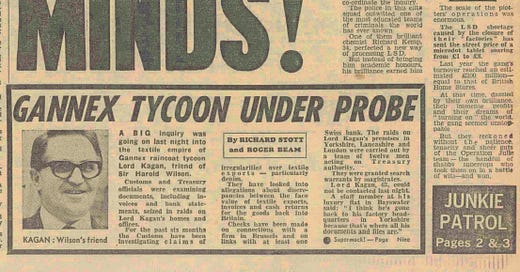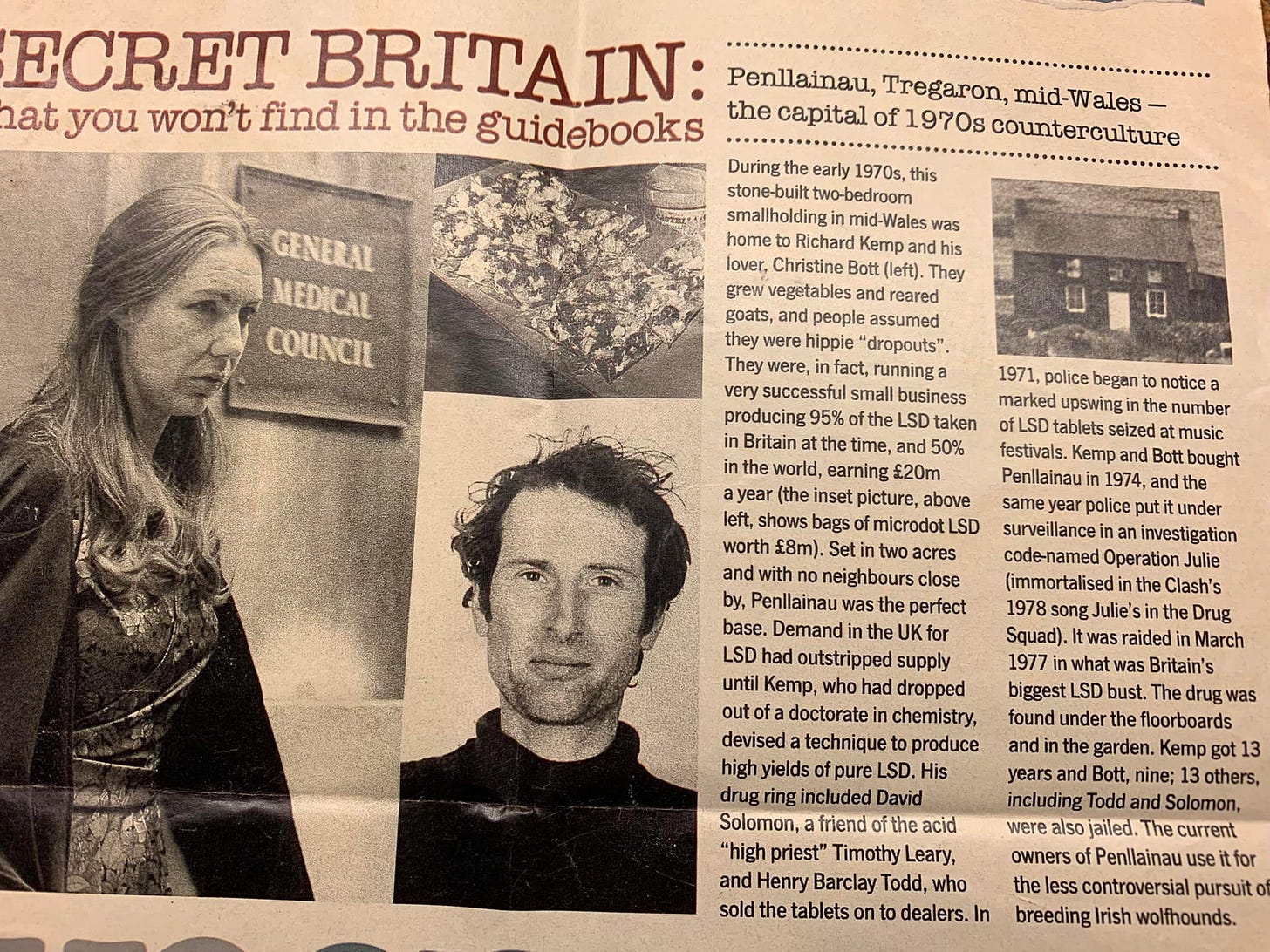Flashback: The LSD in the Water Supply Myth
Operation Julie and the journocops of the Daily Mirror (and the BBC)
On 26 March 1977, Britain’s first national police operation - codenamed ‘Julie’ - targeted secret LSD laboratories and distribution networks in the ‘biggest drugs raid in British history’. A year later, on 8 March 1978, at Bristol Crown Court, 29 of those arrested were handed down prison sentences totalling 170 years. Days after the trial ended, the Daily Mirror, ‘revealed’ something that the prosecution had, apparently, chosen to ignore:
‘An entire city stoned on a nightmare drug – that was the crazy ambition of the masterminds behind the world’s biggest LSD factory.’
The story, which was police-sourced, was written by Ed Laxton, the ghost writer for Operation Julie undercover officer Martyn Pritchard’s book, Busted! The Sensational Life-Story of an Undercover Hippie (1978).
The ‘masterminds’ of the ‘Microdot Gang’ were chemist Richard Kemp and his partner Dr Christine Bott. In the trial Kemp had got 13 year sentence, Bott 9 years.
The Mirror continued:
'Top chemist Richard Kemp and his mistress... planned to blow a million minds simultaneously by pouring pure LSD into the reservoirs serving Birmingham. Detectives were horrified when they heard what the drug barons had in mind.'
But what had they heard? And from whom did they hear it?
‘Water Pollution Specialists’
In June 1972, members of the Microdot Gang visited Amlwch, in Anglesey, north Wales, looking to buy property from which to carry on their LSD business. Kemp’s business partner, David Solomon, brought along Gerry Thomas, fellow American and marine biologist. Thomas gave a business card to local resident, John Mason, whose house Solomon wanted to buy. Thomas’s card read, ‘Pollution Control Associates: Water Pollution Specialists, BCM Pulocon, WCI V6XX. Tel 01 405 0463/4.’ Five years later, when Mason read in the papers about Operation Julie and recognised some of the names and the mugshots, he handed the card to the police. The company turned out to have been largely a front for Thomas’s endeavours with Solomon to make synthetic cocaine and THC in a laboratory.
In 1972, Gerry Thomas had been assigned by Richard Kemp to the job of tableting the LSD he had made. But after a few months Kemp discovered that Thomas was dipping the stash and sacked him. Unwisely, Solomon kept him on for his own ventures, but in June 1973, Thomas was arrested in Canada when customs officers seized seven kilos of hash he had imported from India. Found in his possession was another business card giving the address of a rented warehouse in London which contained documents and equipment for drugs manufacture. Assuming that the Canadian police would pass the information on to their British counterparts, Thomas telephoned Solomon as soon as he was bailed and urged him to remove compromising materials from the warehouse. Solomon, however, took no chances; he collected all of the contents and destroyed them. When Thomas next telephoned Solomon he was enraged by Solomon’s ruthlessness. Solomon’s response was that under the circumstances Thomas shouldn’t be contacting him and told him not to call again.
Thomas then wrote an angry racist letter to his girlfriend in London, Shirley Burridge, saying ‘I’m going to show the dirty jew bastard and the rest of his grotty crew.’ She showed the letter to Solomon, who told Kemp about it. Solomon said he knew so much about Thomas’ criminal career that he didn’t think Thomas would rat them out. But they couldn’t sure that he hadn’t. As it happened, he had, and the Microdot Gang was doomed from then on, though it would take the British police another four years to close them down.
In 1976 Operation Julie police visited Gerry Thomas at his new home in California. Whether or not this ‘Water Pollution Specialist’ alleged that the Microdot Gang had planned to use his expertise to lace a reservoir with LSD is not known. But given Thomas’s criminal status, the British Crown Prosecution Service didn’t think his testimony would be of much use in court and knew better than to run the ‘acid in the water supply’ allegation past a jury. If they had the defence would simply have got a qualified scientist to testify that LSD would have been quite ineffective in a reservoir because dilution and the chlorine content would have neutralised it. The Mirror reporters and police must have known this, but evidently didn’t care; the acid-in-the-waqter-supply myth had long been established to serve the media’s moral panics about ‘drugs’; to point out its obvious falsity would have been perceived as ideologically ‘unhelpful’, and a case of ‘sending the wrong message’. The story was obviously intended to quell any sympathy the public might have had for the hippie defendants.
‘Microdoctrine’
There were reasons for that. For Kemp was something of a green prophet and - potentially - could have claimed status as a political prisoner. Whilst on remand in prison he had written an 8,000-word statement which he intended to present at the Julie trial in 1978, but he was dissuaded from doing so by his lawyers, who thought that, as it was so political and unrepentant, it would get him a stiffer sentence. A week after the trial ended, parts of the document were published in the Cambrian News. Journalist Patrick O’Brien introduced it as ‘Microdoctrine – the beliefs behind Kemp’s LSD,’ and summarised Kemp’s views on ecology:
“On ecology and conservation Kemp believes it is obvious we are living on the world’s capital rather than its income. He says that to achieve a level of consumption that is reasonable, taking into account the Earth’s limited and dwindling resources, two things are necessary. People will have accept a lower stand of living by being content with having things which are necessary for survival, and luxuries will have to kept to minimum. Secondly these goods which are supplied will have to be built to have the longest possible lifespan, at the end of which they must be capable of being recycled… In common with expert scientific opinion he was convinced that, if Earth’s raw materials were to be conserved and pollution reduced to a tolerable level, there would have to be a revolution in people’s attitude. And he believed LSD could spark changes in outlook and put the world on the road to survival.”
Kemp wrote in his own words:
“It has been my experience and that of many of those I know, that LSD helps to make one realise that happiness is a state of mind and not a state of ownership.”
And,
“Insofar as LSD can catalyze such a change in members of the public, it can contribute to thisend… I have never believed that LSD is the substitute for the hard work required to change oneself. One might say it is a signpost pointing a way to self-discovery.”
So what happened to Kemp’s original document? Patrick O’Brien, the journalist on the Cambrian News in 1978, has written to me revealing - among other things - that after he published the extracts in the Cambrian News he was approached by Elwyn Jones, (1923-82), TV producer, screen-writer for BBC’s cop dramas (Z-Cars, Softly Softly) and former Head of the BBC’s Drama Department. Jones persuaded O’Brien to lend him the document (of which there were no copies) and Jones basically stole it. This was, it seems, another historic example of the BBC’s notorious loyalty to the ‘Establishment’: not so much a case ‘catch-and-kill’ as ‘snatch-and-kill’, intended to suppress the ideas of a dissident.
Here is the letter O’Brien sent me.
JUNE 1 2023. From Patrick O’Brien.
Credit, insofar as it matters, for that cleverly descriptive word ‘Microdoctrine’ belongs solely to the late Ken Hankey, a sub-editor at The Cambrian News, who dreamt it up as the single-word headline for my story about Richard Kemp published in 1978.
The second fact is that Richard sent me his hand-written statement from prison and, in the interest of balance, I got extracts printed in The Observer and in The Cambrian News (post-publication, the then managing director of The Cambrian News, Henry Read, expressed quite disapproval about the story, muttering about not wanting to give publicity to ‘criminals’).
Subsequently, I was approached by Elwyn Jones, at the time a fairly well known television writer and producer, who persuaded me to lend him the document, short-term, in connection with a piece he said he was working on for the BBC. He promised faithfully to return it quickly. I trusted him to do just that, having judged him to be someone of integrity. I was wrong. He wasn’t. Despite strenuous efforts, I failed to get the document back. Basically, he stole it, and forever afterwards I kicked myself for trusting him. I was conned. Jones died in 1982 having never, as far as I know, come up with anything at all on the LSD saga.
I knew Richard and Christine personally, while not having the faintest clue about their secret life. Overall, I think the purity of purpose of Richard’s mission (I absolutely agree with what he says about the way the world was, and is, going) was greatly diminished by the money-making motive, though I’m sure others in the enterprise were far more interested than he in the lucre. I also think it is dangerous and highly irresponsible to make LSD available, cheap, to all and sundry, given that it’s common knowledge that anyone taking it needs advice on potential problems and support while they’re taking it. Christine, for example, acknowledges this in her memoir. I do actually think that everyone making, distributing and selling this LSD were potentially dicing with people’s lives, which is why the glamorisation of the story, which persists, and especially perhaps its having been made into a rock opera, I find pretty crass.
It would seem then, that Richard Kemp’s ‘Microdoctrine’ is lost to history. There is, however, the theoretical possibility that the document found its way via Elwyn Jones and his police contacts into the files of the Director of Public Prosecutions’ Case Papers, which are held in the National Archives at Kew. The collection contains a file on Operation Julie: Date:1977 Jan 01 - 1987 Dec 31; reference: DPP 2/6372. Unfortunately the record is closed for 72 years; it won’t be opened until I January 2060.






